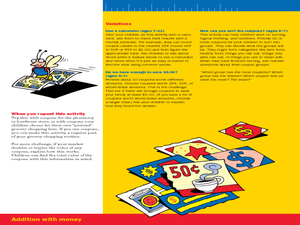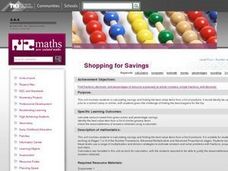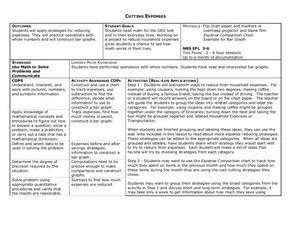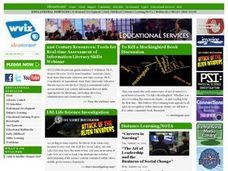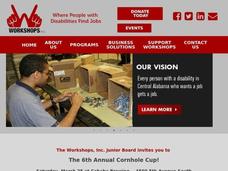Visa
Make It Happen: Saving for a Rainy Day
Every little penny counts, especially when it comes to saving for emergencies or long-term goals. Pupils evaluate different saving and investment strategies, such as a CD or money market account, through worksheets and by researching...
Practical Money Skills
Saving and Investing
Learn the difference between saving money and investing money, as well as the advantages and disadvantages of each. Kids review banking and personal finance terms before studying the different ways that people can reach their financial...
Practical Money Skills
Budgeting Your Money
How do you make sure that your income doesn't disappear before you have a chance to save it? Use a creative budgeting activity to teach learners in both special education and mainstream classes how to keep track of their expenditures and...
Curated OER
Take Time to Save Now
Students brainstorm reasons to save money, investigate impact of saving regularly using interactive, on-line calculators, explain how compounding interest affects savings, explore different strategies for saving money, and write personal...
Curated OER
How Much Do We Save?
Students use coupons to save. In this saving lesson students practice their addition, multiplication and estimating skills with dollars and cents. They investigate grocery coupons and look for ways to save money.
Curated OER
Budgeting
Students explore what butgeting means. In this mathematics lesson, students determine that certain things need to be part of a budget like food and clothing by answering real-life types of questions on whether one should save money and...
Curated OER
Shopping for Savings
Fourth graders calculate savings and identify the best value items from a list of products. They rotate through five studying stations, completing various math activities involving calculators and solving problems related to shopping...
Curated OER
Show And Tell
Have you ever saved your money to buy something you really wanted? Elementary schoolers share how they saved their money for things they wanted, and they bring in one or two items that they bought with their personal savings.
Alabama Learning Exchange
Coins to Bills!
Students practice using money at a grocery store. For this money lesson, students get familiar with grocery store ads and work in pairs to use these ads to select food items to purchase using money manipulatives. Students practice being...
Curated OER
Managing Your Money
Students use the internet to gather information on saving money. They describe the history of money and the responsibilities of the United States Mint. They list their own personal goals and keep a journal as they operate a lemonade...
Curated OER
Describe How Money Barter, and Credit Were Used in Colonial Virginia
Fourth graders listen as the teacher lectures about bartering. They work in small groups to define and create a skit about one term related to bartering. Students create an Economic Terms booklet. They review that tobacco was a cash crop...
Curated OER
Marriage and Financial Goals, Budgeting Strategies
There is no more useful life skill to learn than budgeting and setting financial goals. It's math that is used by every person, everyday. Learners examine the responsibilities and costs involved in family economics. Through a series of...
Curated OER
Invest In Yourself
Students learn about budgeting, saving, dept, financial management, opportunity cost, and self-regulation. In this financial management lesson, students apply their knowledge of finance components and create their own web based plan...
Curated OER
Money Talks Canadian Money
Students use newspapers, games and journal writing activities to examine the importance of money and the role it plays in daily life. They complete several math problems, fill out worksheets and practice changing varying amounts.
Curated OER
Making Choices to Save Money on Food
Students review lists of coupons and complete a worksheet to analyze the benefits of the specials. For this household budget lesson, students determine which foods are nutritional and the advantages of using coupons or specials to save...
Curated OER
Cutting Expenses
Students explore budgeting. In this finance and math lesson, students brainstorm ways in which households could save money. Students view websites that give cost reducing ideas. Students complete an expense comparison chart and use the...
Curated OER
Strategies for Success
Students share opinions about common bad habits, read about behavior economics by reading and discussing article "Your Plate Is Bigger Than Your Stomach," identify goals and strategies designed to improve negative behaviors, and test...
Federal Reserve Bank
Retirement Planning
It's never too early to start saving for retirement. In fact, the earlier one starts, the better! Use this retirement planning activity to teach the importance of a retirement strategy and why to start at a young age.
Curated OER
The Berenstain Bears' Mad, Mad, Mad Toy Craze
Students use the book, The Berenstain Bears' Mad, Mad, Mad Toy Craze, to explore spending, collecting, opportunity cost, saving, and speculating.
Curated OER
The Great Cookie Company
Fourth graders implement real life application of money, problem solving, economics, and consumer awareness. In this three week economics unit, 4th graders operate a business, write checks, balance accounts, and market their product.
Curated OER
How do You Stack Up? Revisited
Students estimate the thickness of coins. For this stack up lesson, students stack pennies, nickels, dimes and quarters. They calculate and record the thickness of each coin. Students stack coins and estimate the height of the stack.
Curated OER
Lemonade Stand: Making Money the Old-Fashioned Way
Students run their own lemonade stand and are to figure out what to sell the lemonade at to gain the maximum profit.
Curated OER
How to Protect Your Money
Pupils review the basics of investing. They discuss saving strategies and investing fundamentals. Afterward, they consider a scenario from different investment perspectives.
Visa
Money Matters: Why It Pays to Be Financially Responsible
What does it mean to be financially responsible? Pupils begin to develop the building blocks of strong financial decision making by reviewing how their past purchases are examples of cost comparing, cost-benefit analysis, and budgeting.






